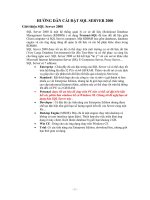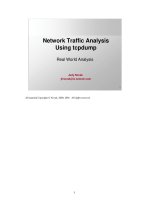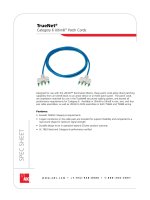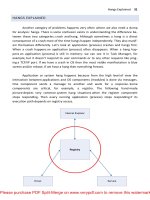Tài liệu Memory Dump Analysis Anthology- P23 ppt
Bạn đang xem bản rút gọn của tài liệu. Xem và tải ngay bản đầy đủ của tài liệu tại đây (525.57 KB, 30 trang )
Windows Service Crash Dumps in Vista 661
Loading Dump File
[C:\ProgramData\Microsoft\Windows\WER\ReportQueue\Report19527353
\WER7346.tmp.mdmp]
User Mini Dump File: Only registers, stack and portions of memory are
available
Symbol search path is:
srv*c:\mss*
Executable search path is:
Windows Vista Version 6000 MP (2 procs) Free x64
Product: WinNt, suite: SingleUserTS
Debug session time: Fri Sep 28 16:36:38.000 2007 (GMT+1)
System Uptime: 2 days 1:42:22.810
Process Uptime: 0 days 0:00:10.000
This dump file has an exception of interest stored in it.
The stored exception information can be accessed via .ecxr.
(13b0.d54): Access violation - code c0000005 (first/second chance not
available)
simple!service_ctrl+0x19:
00000000`00401ab9 c704250000000000000000 mov dword ptr [0],0
ds:00000000`00000000=????????
0:000> k
Child-SP RetAddr Call Site
00000000`0012fab0 000007fe`fe276cee simple!service_ctrl+0x19
00000000`0012faf0 000007fe`fe2cea5d advapi32!ScDispatcherLoop+0x54c
00000000`0012fbf0 00000000`004019f5
advapi32!StartServiceCtrlDispatcherA+0x8d
00000000`0012fe70 00000000`00408b8c simple!main+0x155
00000000`0012fec0 00000000`0040895e simple!__tmainCRTStartup+0x21c
00000000`0012ff30 00000000`7792cdcd simple!mainCRTStartup+0xe
00000000`0012ff60 00000000`77a7c6e1 kernel32!BaseThreadInitThunk+0xd
00000000`0012ff90 00000000`00000000 ntdll!RtlUserThreadStart+0x1d
Fault in any other service thread, for example, the one that SCM starts per every
SERVICE_TABLE_ENTRY in dispatch table results in a default postmortem debugger sav-
ing a crash dump on Windows Server 2003 x64 but not on Vista x64 or Vista x86 (32-bit):
void __cdecl main(int argc, char **argv)
{
SERVICE_TABLE_ENTRY dispatchTable[] =
{
{ TEXT(SZSERVICENAME),
(LPSERVICE_MAIN_FUNCTION)service_main},
{ NULL, NULL}
};
if (!StartServiceCtrlDispatcher(dispatchTable))
Please purchase PDF Split-Merge on www.verypdf.com to remove this watermark.
662 PART 13: Miscelleneous
AddToMessageLog(TEXT("StartServiceCtrlDispatcher
failed."));
}
void WINAPI service_main(DWORD dwArgc, LPTSTR *lpszArgv)
{
// register our service control handler:
//
sshStatusHandle = RegisterServiceCtrlHandler(
TEXT(SZSERVICENAME), service_ctrl);
if (!sshStatusHandle)
goto cleanup;
// SERVICE_STATUS members that don't change in example
//
ssStatus.dwServiceType = SERVICE_WIN32_OWN_PROCESS;
ssStatus.dwServiceSpecificExitCode = 0;
// report the status to the service control manager.
//
if (!ReportStatusToSCMgr(
SERVICE_START_PENDING, // service state
NO_ERROR, // exit code
3000)) // wait hint
goto cleanup;
*(int *)NULL = 0;
…
…
…
}
Seems the only way to get a crash minidump for analysis is to copy it from the re-
port data like I explained above:
Loading Dump File
[C:\ProgramData\Microsoft\Windows\WER\ReportQueue\Report0fa05f9d
\WER5F42.tmp.mdmp]
User Mini Dump File: Only registers, stack and portions of memory are
available
Symbol search path is:
srv*c:\mss*
Executable search path is:
Windows Vista Version 6000 MP (2 procs) Free x64
Product: WinNt, suite: SingleUserTS
Debug session time: Fri Sep 28 17:50:06.000 2007 (GMT+1)
System Uptime: 0 days 0:30:59.495
Process Uptime: 0 days 0:00:04.000
This dump file has an exception of interest stored in it.
Please purchase PDF Split-Merge on www.verypdf.com to remove this watermark.
Windows Service Crash Dumps in Vista 663
The stored exception information can be accessed via .ecxr.
(d6c.fcc): Access violation - code c0000005 (first/second chance not
available)
simple!service_main+0x60:
00000000`00401aa0 c704250000000000000000 mov dword ptr [0],0
ds:00000000`00000000=????????
0:001> ~*k
0 Id: d6c.cf4 Suspend: 0 Teb: 000007ff`fffdd000 Unfrozen
Child-SP RetAddr Call Site
00000000`0012f978 00000000`777026da ntdll!NtReadFile+0xa
00000000`0012f980 000007fe`feb265aa kernel32!ReadFile+0x8a
00000000`0012fa10 000007fe`feb262e3 advapi32!ScGetPipeInput+0x4a
00000000`0012faf0 000007fe`feb7ea5d advapi32!ScDispatcherLoop+0x9a
00000000`0012fbf0 00000000`004019f5
advapi32!StartServiceCtrlDispatcherA+0x8d
00000000`0012fe70 00000000`00408bac simple!main+0x155
00000000`0012fec0 00000000`0040897e simple!__tmainCRTStartup+0x21c
00000000`0012ff30 00000000`7770cdcd simple!mainCRTStartup+0xe
00000000`0012ff60 00000000`7792c6e1 kernel32!BaseThreadInitThunk+0xd
00000000`0012ff90 00000000`00000000 ntdll!RtlUserThreadStart+0x1d
# 1 Id: d6c.fcc Suspend: 0 Teb: 000007ff`fffdb000 Unfrozen
Child-SP RetAddr Call Site
00000000`008eff00 000007fe`feb24bf5 simple!service_main+0x60
00000000`008eff30 00000000`7770cdcd advapi32!ScSvcctrlThreadW+0x25
00000000`008eff60 00000000`7792c6e1 kernel32!BaseThreadInitThunk+0xd
00000000`008eff90 00000000`00000000 ntdll!RtlUserThreadStart+0x1d
Spawning a custom thread with NULL pointer access violation doesn’t result in a
crash dump on my Vista x86 and x64 too. Therefore it appears that there are no auto-
matic postmortem crash dumps saved for native Window services in Vista unless there
is some setting that I missed. This might create some problems for traditional 3rd party
Technical Support procedures. However it appears that there is a possible solution with
Vista SP1 and Windows Server 2003 (page 606).
Please purchase PDF Split-Merge on www.verypdf.com to remove this watermark.
664 PART 13: Miscelleneous
THE ROAD TO KERNEL SPACE
If you are developing and debugging user space applications (and/or doing crash
dump analysis in user space) and you want to understand Windows kernel dumps and
device drivers better (and probably start writing your own kernel tools) here is the read-
ing list I found the most effective:
0. Read and re-read Windows Internals book in parallel while reading all other
books. It shows you the big picture and some useful WinDbg commands and techniques
but you need to read device driver books to fill the gaps and be confident in kernel
space.
1. Start with “The Windows 2000 Device Driver Book: A Guide for Programmers
(2nd Edition)”. This short book shows the basics and you can start writing drivers and
kernel tools immediately.
2. Next read “Windows NT Device Driver Development” book to consolidate your
knowledge.
3. Don’t stop here. Read “Developing Windows NT Device Drivers:
A Programmer’s Handbook”. This very good book explains everything in great detail and
good pictures.
4. Continue with WDM drivers and modern presentation: “Programming the
Microsoft Windows Driver Model, Second Edition”. Must read even if your drivers are
not WDM.
5. Finally read “Developing Drivers with the Windows Driver Foundation” book as
this is the future and it also covers ETW (event tracing for Windows), WinDbg exten-
sions, PREfast and static driver verifier.
Additional reading (not including DDK Help which you will use anyway) can be
done in parallel after finishing “Windows NT Device Driver Development” book:
1. OSR NT Insider articles:
2. “Windows NT File System Internals”.
Please purchase PDF Split-Merge on www.verypdf.com to remove this watermark.
The Road to Kernel Space 665
3. “Rootkits: Subverting the Windows Kernel” book shows Windows kernel from
a hacker perspective.
Please purchase PDF Split-Merge on www.verypdf.com to remove this watermark.
666 PART 13: Miscelleneous
MEMORY DUMP ANALYSIS INTERVIEW QUESTIONS
The following interview questions might be useful to assess the skill level in crash
dump analysis on Windows platforms. These could be useful for debugging interviews as
well.
1. What is FPO?
2. How many exceptions can be found in a crash dump?
3. You see the following message from WinDbg:
WARNING: Stack unwind information not available. Following frames
may be wrong.
What would you do?
4. How would you find spinlock implementation if you have a kernel dump?
5. What is OMAP?
6. What is full page heap?
7. Company name is missing from module information. How would you try to find
it?
8. What is IDT?
9. How does a postmortem debugger work?
10. You’ve got a mini dump of your application. How would you disassemble the
code?
11. Memory consumption is growing for an application. How would you discover
the leaking component?
12. What is IRQL?
13. When do you use TEB?
14. You’ve got 200 process dumps from a server. You need to find a deadlock.
How would you do it?
15. You’ve got a complete memory dump from a server. You need to find a dead-
lock. How would you do it?
16. What is GC heap?
17. Your customer is reluctant to send a dump file due to security policies. What is
your next step?
18. What is a first chance exception?
Please purchase PDF Split-Merge on www.verypdf.com to remove this watermark.
Music for Debugging 667
MUSIC FOR DEBUGGING
Debugging and understanding multithreaded programs is hard and sometimes it
requires running several execution paths mentally. Here listening to composers who use
multithreading in music can help. My favorite is J.S. Bach. Virtuoso and heroic music
helps me in live debugging too and here my favorites are Chopin, Liszt and Beethoven.
Many software engineers listen to music when writing code and I’m not the
exception. However, I have found that not all music suitable for programming helps me
during debugging sessions.
Music for relaxation, quiet classical or modern music helps me to think about
program design and write solid code. Music with several melodies played simulta-
neously, heroic and virtuoso works help me to achieve breakthrough and find a bug. The
latter kind of music also suits me for listening when doing crash dump analysis or prob-
lem troubleshooting.
Please purchase PDF Split-Merge on www.verypdf.com to remove this watermark.
668 PART 13: Miscelleneous
PDBFINDER
Version 3.5 uses the new binary database format and achieves the following
results compare to the previous version 3.0.1:
2 times smaller database size
5 times faster database load time on startup!
It is fully backwards compatible with 3.0.1 and 2.x database formats and silently
converts your old database to the new format on the first load.
Additionally the new version fixes the bug in version 3.0.1 sometimes manifested
when removing and then adding folders before building the new database which
resulted in incorrectly built database.
The next version 4.0 is currently under development and it will have the
following features:
The ability to open multiple databases
The ability to exclude certain folders during build to avoid excessive search
results output
Fully configurable OS and language search options (which are currently
disabled for public version)
PDBFinder upgrade is available for download from Citrix support:
Please purchase PDF Split-Merge on www.verypdf.com to remove this watermark.
When a Process Dies Silently 669
WHEN A PROCESS DIES SILENTLY
There are cases when a default postmortem debugger doesn’t save a dump file.
This is because the default postmortem debugger is called from the crashed application
thread on Windows prior to Vista and if a thread stack is exhausted or critical thread
data is corrupt there is no user dump. On Vista the default postmorten debugger is
called from WER (Windows Error Reporting) process WerFault.exe so there is a chance
that it can save a user dump. During my experiments today on Windows 2003 (x64) I
found that if we have a stack overflow inside a 64-bit process then the process silently
dies. This doesn’t happen for 32-bit processes on the same server or on a native 32-bit
OS. Here is the added code from the modified default Win32 API project created in Vis-
ual Studio 2005:
volatile DWORD dwSupressOptimization;
void SoFunction();
LRESULT CALLBACK WndProc(HWND hWnd, UINT message, WPARAM
wParam, LPARAM lParam)
{
case WM_PAINT:
hdc = BeginPaint(hWnd, &ps);
SoFunction();
EndPaint(hWnd, &ps);
break;
}
void SoFunction()
{
if (++dwSupressOptimization)
{
SoFunction();
WndProc(0,0,0,0);
}
}
Adding WndProc call to SoFunction is done to eliminate an optimization in Re-
lease build when a recursion call is transformed into a loop:
Please purchase PDF Split-Merge on www.verypdf.com to remove this watermark.
670 PART 13: Miscelleneous
void SoFunction()
{
if (++dwSupressOptimization)
{
SoFunction();
}
}
0:001> uf SoFunction
00401300 mov eax,1
00401305 jmp StackOverflow!SoFunction+0x10 (00401310)
00401310 add dword ptr [StackOverflow!dwSupressOptimization
(00403374)],eax
00401316 mov ecx,dword ptr [StackOverflow!dwSupressOptimization
(00403374)]
0040131c jne StackOverflow!SoFunction+0x10 (00401310)
0040131e ret
Therefore without WndProc added or more complicated SoFunction there is no
stack overflow but a loop with 4294967295 (0xFFFFFFFF) iterations.
If we compile an x64 project with WndProc call included in SoFunction and run it
we would never get a dump file from any default postmortem debugger although
TestDefaultDebugger64 (page 641) tool crashes with a dump. We can also observe a
strange behavior that the application disappears only during the second window repaint
although it shall crash immediately when we launch it and the main window is shown.
What we see is when we launch the application it is running and the main window is
visible. When we force it to repaint by minimizing and then maximizing, for example,
only then it disappears from the screen and the process list. If we launch 64-bit WinDbg,
load and run our application we would hit the first chance exception:
0:000> g
(159c.fc4): Stack overflow - code c00000fd (first chance)
First chance exceptions are reported before any exception handling.
This exception may be expected and handled.
StackOverflow!SoFunction+0x22:
00000001`40001322 e8d9ffffff call StackOverflow!SoFunction
(00000001`40001300)
Stack trace looks like normal stack overflow:
0:000> k
Child-SP RetAddr Call Site
00000000`00033fe0 00000001`40001327 StackOverflow!SoFunction+0x22
00000000`00034020 00000001`40001327 StackOverflow!SoFunction+0x27
00000000`00034060 00000001`40001327 StackOverflow!SoFunction+0x27
00000000`000340a0 00000001`40001327 StackOverflow!SoFunction+0x27
00000000`000340e0 00000001`40001327 StackOverflow!SoFunction+0x27
Please purchase PDF Split-Merge on www.verypdf.com to remove this watermark.
When a Process Dies Silently 671
00000000`00034120 00000001`40001327 StackOverflow!SoFunction+0x27
00000000`00034160 00000001`40001327 StackOverflow!SoFunction+0x27
00000000`000341a0 00000001`40001327 StackOverflow!SoFunction+0x27
00000000`000341e0 00000001`40001327 StackOverflow!SoFunction+0x27
00000000`00034220 00000001`40001327 StackOverflow!SoFunction+0x27
00000000`00034260 00000001`40001327 StackOverflow!SoFunction+0x27
00000000`000342a0 00000001`40001327 StackOverflow!SoFunction+0x27
00000000`000342e0 00000001`40001327 StackOverflow!SoFunction+0x27
00000000`00034320 00000001`40001327 StackOverflow!SoFunction+0x27
00000000`00034360 00000001`40001327 StackOverflow!SoFunction+0x27
00000000`000343a0 00000001`40001327 StackOverflow!SoFunction+0x27
00000000`000343e0 00000001`40001327 StackOverflow!SoFunction+0x27
00000000`00034420 00000001`40001327 StackOverflow!SoFunction+0x27
00000000`00034460 00000001`40001327 StackOverflow!SoFunction+0x27
00000000`000344a0 00000001`40001327 StackOverflow!SoFunction+0x27
RSP is inside stack guard page during the CALL instruction.
0:000> r
rax=0000000000003eed rbx=00000000000f26fe rcx=0000000077c4080a
rdx=0000000000000000 rsi=000000000000000f rdi=0000000000000000
rip=0000000140001322 rsp=0000000000033fe0 rbp=00000001400035f0
r8=000000000012fb18 r9=00000001400035f0 r10=0000000000000000
r11=0000000000000246 r12=000000000012fdd8 r13=000000000012fd50
r14=00000000000f26fe r15=0000000000000000
iopl=0 nv up ei pl nz na po nc
cs=0033 ss=002b ds=002b es=002b fs=0053 gs=002b efl=00010206
StackOverflow!SoFunction+0×22:
00000001`40001322 e8d9ffffff call StackOverflow!SoFunction
(00000001`40001300)
0:000> uf StackOverflow!SoFunction
00000001`40001300 sub rsp,38h
00000001`40001304 mov rax,qword ptr [StackOverflow!__security_cookie
(00000001`40003000)]
00000001`4000130b xor rax,rsp
00000001`4000130e mov qword ptr [rsp+20h],rax
00000001`40001313 add dword ptr [StackOverflow!dwSupressOptimization
(00000001`400035e4)],1
00000001`4000131a mov eax,dword ptr
[StackOverflow!dwSupressOptimization (00000001`400035e4)]
00000001`40001320 je StackOverflow!SoFunction+0×37
(00000001`40001337)
00000001`40001322 call StackOverflow!SoFunction (00000001`40001300)
00000001`40001327 xor r9d,r9d
00000001`4000132a xor r8d,r8d
00000001`4000132d xor edx,edx
00000001`4000132f xor ecx,ecx
00000001`40001331 call qword ptr [StackOverflow!_imp_DefWindowProcW
(00000001`40002198)]
00000001`40001337 mov rcx,qword ptr [rsp+20h]
00000001`4000133c xor rcx,rsp
Please purchase PDF Split-Merge on www.verypdf.com to remove this watermark.
672 PART 13: Miscelleneous
00000001`4000133f call StackOverflow!__security_check_cookie
(00000001`40001360)
00000001`40001344 add rsp,38h
00000001`40001348 ret
However this guard page is not the last stack page as can be seen from TEB and
the current RSP address (0×33fe0):
0:000> !teb
TEB at 000007fffffde000
ExceptionList: 0000000000000000
StackBase: 0000000000130000
StackLimit: 0000000000031000
SubSystemTib: 0000000000000000
FiberData: 0000000000001e00
ArbitraryUserPointer: 0000000000000000
Self: 000007fffffde000
EnvironmentPointer: 0000000000000000
ClientId: 000000000000159c . 0000000000000fc4
RpcHandle: 0000000000000000
Tls Storage: 0000000000000000
PEB Address: 000007fffffd5000
LastErrorValue: 0
LastStatusValue: c0000135
Count Owned Locks: 0
HardErrorMode: 0
If we continue execution and force the main application window to invalidate (re-
paint) itself we get another first chance exception instead of second chance:
0:000> g
(159c.fc4): Access violation - code c0000005 (first chance)
First chance exceptions are reported before any exception handling.
This exception may be expected and handled.
StackOverflow!SoFunction+0x22:
00000001`40001322 call StackOverflow!SoFunction (00000001`40001300)
What we see now is that RSP is outside the valid stack region (stack limit)
0×31000:
0:000> k
Child-SP RetAddr Call Site
00000000`00030ff0 00000001`40001327 StackOverflow!SoFunction+0×22
00000000`00031030 00000001`40001327 StackOverflow!SoFunction+0×27
00000000`00031070 00000001`40001327 StackOverflow!SoFunction+0×27
00000000`000310b0 00000001`40001327 StackOverflow!SoFunction+0×27
00000000`000310f0 00000001`40001327 StackOverflow!SoFunction+0×27
00000000`00031130 00000001`40001327 StackOverflow!SoFunction+0×27
00000000`00031170 00000001`40001327 StackOverflow!SoFunction+0×27
00000000`000311b0 00000001`40001327 StackOverflow!SoFunction+0×27
Please purchase PDF Split-Merge on www.verypdf.com to remove this watermark.
When a Process Dies Silently 673
00000000`000311f0 00000001`40001327 StackOverflow!SoFunction+0×27
00000000`00031230 00000001`40001327 StackOverflow!SoFunction+0×27
00000000`00031270 00000001`40001327 StackOverflow!SoFunction+0×27
00000000`000312b0 00000001`40001327 StackOverflow!SoFunction+0×27
00000000`000312f0 00000001`40001327 StackOverflow!SoFunction+0×27
00000000`00031330 00000001`40001327 StackOverflow!SoFunction+0×27
00000000`00031370 00000001`40001327 StackOverflow!SoFunction+0×27
00000000`000313b0 00000001`40001327 StackOverflow!SoFunction+0×27
00000000`000313f0 00000001`40001327 StackOverflow!SoFunction+0×27
00000000`00031430 00000001`40001327 StackOverflow!SoFunction+0×27
00000000`00031470 00000001`40001327 StackOverflow!SoFunction+0×27
00000000`000314b0 00000001`40001327 StackOverflow!SoFunction+0×27
0:000> r
rax=0000000000007e98 rbx=00000000000f26fe rcx=0000000077c4080a
rdx=0000000000000000 rsi=000000000000000f rdi=0000000000000000
rip=0000000140001322 rsp=0000000000030ff0 rbp=00000001400035f0
r8=000000000012faa8 r9=00000001400035f0 r10=0000000000000000
r11=0000000000000246 r12=000000000012fd68 r13=000000000012fce0
r14=00000000000f26fe r15=0000000000000000
iopl=0 nv up ei pl nz na pe nc
cs=0033 ss=002b ds=002b es=002b fs=0053 gs=002b efl=00010202
StackOverflow!SoFunction+0×22:
00000001`40001322 call StackOverflow!SoFunction (00000001`40001300)
Therefore we expect the second chance exception at the same address here and
we get it indeed when we continue execution:
0:000> g
(159c.fc4): Access violation - code c0000005 (!!! second chance !!!)
StackOverflow!SoFunction+0x22:
00000001`40001322 call StackOverflow!SoFunction (00000001`40001300)
Now we see why the process died silently. There was no stack space left for
exception dispatch handler functions and therefore for the default unhandled exception
filter that launches the default postmortem debugger to save a process dump. So it
looks like on x64 Windows when our process had first chance stack overflow exception
there was no second chance exception afterwards and after handling the first chance
stack overflow exception process execution resumed and finally hit its thread stack limit.
This doesn’t happen with 32-bit processes even on x64 Windows where unhandled first
chance stack overflow exception results in immediate second chance stack overflow
exception at the same stack address and therefore there is a sufficient room for the lo-
cal variables for exception handler and filter functions.
This is an example of what happened before exception handling changes in Vista.
Please purchase PDF Split-Merge on www.verypdf.com to remove this watermark.
674 PART 13: Miscelleneous
ASLR: ADDRESS SPACE LAYOUT RANDOMIZATION
Vista has the new ASLR feature:
Load address randomization (/dynamicbase linker option)
Stack address randomization (/dynamicbase linker option)
Heap randomization
The first randomization changes addresses across Vista reboots. The second
randomization happens every time we launch an application linked with /dynamicbase
option. The third randomization happens every time we launch an application linked
with or without /dynamicbase option as we will see below.
Let’s check ASLR feature by attaching WinDbg to calc, notepad and pre-Vista
application TestDefaultDebugger (page 641). Obviously native Vista applications use
ASLR.
Comparison between two calc.exe processes inspected separately before and af-
ter reboot shows that the main module and system dlls have different load addresses:
0:000> lm
start end module name
009f0000 00a1e000 calc
74710000 748a4000 comctl32
75b10000 75bba000 msvcrt
…
…
76f00000 76fbf000 ADVAPI32
770d0000 771a8000 kernel32
771b0000 7724e000 USER32
77250000 7736e000 ntdll
0:000> lm
start end module name
00470000 0049e000 calc
…
…
743e0000 74574000 comctl32
…
75730000 757da000 msvcrt
757e0000 7589f000 ADVAPI32
…
75e20000 75ebe000 USER32
…
76cf0000 76dc8000 kernel32
76dd0000 76eee000 ntdll
…
Please purchase PDF Split-Merge on www.verypdf.com to remove this watermark.
ASLR: Address Space Layout Randomization 675
Main module address has different third byte across reboots. I believe that 0×00
is not allowed otherwise we would have 0×00000000 load address. Therefore we have
255 unique load addresses chosen randomly.
Stack addresses are different:
0:000> k
ChildEBP RetAddr
000ffc8c 771d199a ntdll!KiFastSystemCallRet
000ffc90 771d19cd USER32!NtUserGetMessage+0xc
000ffcac 009f24e8 USER32!GetMessageW+0×33
000ffd08 00a02588 calc!WinMain+0×278
000ffd98 77113833 calc!_initterm_e+0×1a1
000ffda4 7728a9bd kernel32!BaseThreadInitThunk+0xe
000ffde4 00000000 ntdll!_RtlUserThreadStart+0×23
0:000> k
ChildEBP RetAddr
0007fbe4 75e4199a ntdll!KiFastSystemCallRet
0007fbe8 75e419cd USER32!NtUserGetMessage+0xc
0007fc04 004724e8 USER32!GetMessageW+0×33
0007fc60 00482588 calc!WinMain+0×278
0007fcf0 76d33833 calc!_initterm_e+0×1a1
0007fcfc 76e0a9bd kernel32!BaseThreadInitThunk+0xe
0007fd3c 00000000 ntdll!_RtlUserThreadStart+0×23
Because module base addresses are different, return addresses on call stacks are
different too.
Heap base addresses are different:
0:000> !heap
Index Address
1: 00120000
2: 00010000
3: 00760000
4: 00990000
5: 00700000
6: 00670000
7: 01320000
Please purchase PDF Split-Merge on www.verypdf.com to remove this watermark.
676 PART 13: Miscelleneous
0:000> !heap
Index Address
1: 001b0000
2: 00010000
3: 00a00000
4: 009c0000
5: 00400000
6: 00900000
7: 01260000
PEB and environment addresses are different:
notepad.exe (PID 1248):
0:000> !peb
PEB at 7ffd4000
Environment: 000507e8
notepad.exe (PID 1370):
0:000> !peb
PEB at 7ffd9000
Environment: 003a07e8
If we look inside TEB we would see that pointers to exception handler list are
different and stack bases are different too:
notepad.exe (PID 1248):
TEB at 7ffdf000
ExceptionList: 0023ff34
StackBase: 00240000
StackLimit: 0022f000
SubSystemTib: 00000000
FiberData: 00001e00
ArbitraryUserPointer: 00000000
Self: 7ffdf000
EnvironmentPointer: 00000000
ClientId: 00001248 . 000004e0
RpcHandle: 00000000
Tls Storage: 7ffdf02c
PEB Address: 7ffd4000
LastErrorValue: 0
LastStatusValue: c0000034
Count Owned Locks: 0
HardErrorMode: 0
Please purchase PDF Split-Merge on www.verypdf.com to remove this watermark.
ASLR: Address Space Layout Randomization 677
notepad.exe (PID 1370):
0:000> !teb
TEB at 7ffdf000
ExceptionList: 001ffa00
StackBase: 00200000
StackLimit: 001ef000
SubSystemTib: 00000000
FiberData: 00001e00
ArbitraryUserPointer: 00000000
Self: 7ffdf000
EnvironmentPointer: 00000000
ClientId: 00001370 . 00001454
RpcHandle: 00000000
Tls Storage: 7ffdf02c
PEB Address: 7ffd9000
LastErrorValue: 5
LastStatusValue: c0000008
Count Owned Locks: 0
HardErrorMode: 0
However if we look at old applications that weren’t linked with /dynamicbase op-
tion we would see that the main module and old dll base addresses are the same:
0:000> lm
start end module name
00400000 00435000 TestDefaultDebugger
20000000 2000d000 LvHook
To summarize different alternatives I created the following table where
“New” column - processes linked with /dynamicbase option, no reboot
“New/Reboot” column - processes linked with /dynamicbase option, reboot
“Old” column - old processes, no reboot
“Old/Reboot” column - old processes, reboot
Please purchase PDF Split-Merge on www.verypdf.com to remove this watermark.
678 PART 13: Miscelleneous
Randomization | New/Reboot | New | Old/Reboot | Old
Module | + | - | - | -
System DLLs | + | - | + | -
Stack | + | + | - | -
Heap | + | + | + | +
PEB | + | + | + | +
Environment | + | + | + | +
ExceptionList | + | + | - | -
From PEB and process heap base addresses we can see that environment ad-
dresses are always correlated with the heap:
0:000> !heap
Index Address Name Debugging options enabled
1: 005f0000
0:000> !peb
PEB at 7ffd7000
ProcessHeap: 005f0000
ProcessParameters: 005f1540
Environment: 005f07e8
I think the reason why Microsoft didn’t enable ASLR by default is to prevent
instances of Changed Environment pattern (page 283).
Please purchase PDF Split-Merge on www.verypdf.com to remove this watermark.
Process and Thread Startup in Vista 679
PROCESS AND THREAD STARTUP IN VISTA
If we looked at process dumps from Vista or did live debugging we might have
noticed that there are no longer kernel32 functions BaseProcessStart on the main
thread stack and BaseThreadStart on subsequent thread stacks. In Vista we have
ntdll!_RtlUserThreadStart which calls kernel32!BaseThreadInitThunk for both main and
secondary threads:
0:002> ~*k
0 Id: 13e8.1348 Suspend: 1 Teb: 7ffdf000 Unfrozen
ChildEBP RetAddr
0009f8d8 77b7199a ntdll!KiFastSystemCallRet
0009f8dc 77b719cd USER32!NtUserGetMessage+0xc
0009f8f8 006b24e8 USER32!GetMessageW+0x33
0009f954 006c2588 calc!WinMain+0x278
0009f9e4 77603833 calc!_initterm_e+0x1a1
0009f9f0 779ea9bd kernel32!BaseThreadInitThunk+0xe
0009fa30 00000000 ntdll!_RtlUserThreadStart+0×23
1 Id: 13e8.534 Suspend: 1 Teb: 7ffde000 Unfrozen
ChildEBP RetAddr
0236f9d8 77a106a0 ntdll!KiFastSystemCallRet
0236f9dc 776077d4 ntdll!NtWaitForSingleObject+0xc
0236fa4c 77607742 kernel32!WaitForSingleObjectEx+0xbe
0236fa60 006b4958 kernel32!WaitForSingleObject+0×12
0236fa78 77603833 calc!WatchDogThread+0×21
0236fa84 779ea9bd kernel32!BaseThreadInitThunk+0xe
0236fac4 00000000 ntdll!_RtlUserThreadStart+0×23
# 2 Id: 13e8.1188 Suspend: 1 Teb: 7ffdd000 Unfrozen
ChildEBP RetAddr
0078fec8 77a3f0a9 ntdll!DbgBreakPoint
0078fef8 77603833 ntdll!DbgUiRemoteBreakin+0×3c
0078ff04 779ea9bd kernel32!BaseThreadInitThunk+0xe
0078ff44 00000000 ntdll!_RtlUserThreadStart+0×23
0:000> .asm no_code_bytes
Assembly options: no_code_bytes
0:000> uf ntdll!_RtlUserThreadStart
ntdll!_RtlUserThreadStart:
779ea996 push 14h
779ea998 push offset ntdll! ?? ::FNODOBFM::`string'+0xb6e (779ff108)
779ea99d call ntdll!_SEH_prolog4 (779f47d8)
779ea9a2 and dword ptr [ebp-4],0
Please purchase PDF Split-Merge on www.verypdf.com to remove this watermark.
680 PART 13: Miscelleneous
779ea9a6 mov eax,dword ptr [ntdll!Kernel32ThreadInitThunkFunction
(77a752a0)]
779ea9ab push dword ptr [ebp+0Ch]
779ea9ae test eax,eax
779ea9b0 je ntdll!_RtlUserThreadStart+0x32 (779c6326)
0:000> dds ntdll!Kernel32ThreadInitThunkFunction l1
77a752a0 77603821 kernel32!BaseThreadInitThunk
Please purchase PDF Split-Merge on www.verypdf.com to remove this watermark.
Race Conditions on a Uniprocessor Machine 681
RACE CONDITIONS ON A UNIPROCESSOR MACHINE
It is a known fact that hidden race conditions in code are manifested more fre-
quently on a multiprocessor machine than on a uniprocessor machine. I was trying to
create an example to illustrate this point and wrote the following code:
volatile bool b;
void thread_true(void *)
{
while(true)
{
b = true;
}
}
void thread_false(void *)
{
while(true)
{
b = false;
}
}
int _tmain(int argc, _TCHAR* argv[])
{
_beginthread(thread_true, 0, NULL);
_beginthread(thread_false, 0, NULL);
while(true)
{
assert (b == false || b == true);
}
return 0;
}
The program has three threads. Two of them are trying to set the same boolean
variable b to different values and the main thread checks that its value is either true or
false. The assertion should fail in the following scenario: the first thread (thread_true)
sets b variable to true value so the first comparison in assertion fails and we expect the
second comparison to succeed but the main thread is preempted by the second thread
(thread_false) that sets that value to false and therefore the second comparison fails
too. We get an assertion dialog in debug build showing that boolean variable b is neither
true nor false!
I compiled and ran that program and it wasn’t failing for hours on my uniproces-
sor laptop. On a multiprocessor machine it was failing in a couple of minutes. If we look
at assertion assembly language code we would see that it is very short so statistically
speaking the chances that our main thread is preempted in the middle of the assertion
are very low. This is because on a uniprocessor machine two threads are running not in
Please purchase PDF Split-Merge on www.verypdf.com to remove this watermark.
682 PART 13: Miscelleneous
parallel but until their quantum is expired. So we should make the assertion code longer
to exceed the quantum. To simulate this I added a call to SwitchToThread function.
When the assertion code yields execution to another thread then, perhaps, that thread
would be thread_false and as soon as it is preempted by main thread again we get the
assertion failure:
volatile bool b;
bool SlowOp()
{
SwitchToThread();
return false;
}
void thread_true(void *)
{
while(true)
{
b = true;
}
}
void thread_false(void *)
{
while(true)
{
b = false;
}
}
int _tmain(int argc, _TCHAR* argv[])
{
_beginthread(thread_true, 0, NULL);
_beginthread(thread_false, 0, NULL);
while(true)
{
assert (b == false || SlowOp() || b == true);
}
return 0;
}
I compiled and ran the program again and I couldn’t see any failure for a long
time. It looks like thread_false is always running before the main thread and when the
main thread is running then due to short-circuit operator || evaluation rule we don’t
have a chance to execute SlowOp(). Then I added a fourth thread called thread_true_2
to make the number of threads setting b variable to true value as twice as many as the
number of threads setting b variable to false value (2 to 1) so we could have more
chances to set b variable to true value before executing the assertion:
Please purchase PDF Split-Merge on www.verypdf.com to remove this watermark.
Race Conditions on a Uniprocessor Machine 683
volatile bool b;
bool SlowOp()
{
SwitchToThread();
return false;
}
void thread_true(void *)
{
while(true)
{
b = true;
}
}
void thread_true_2(void *)
{
while(true)
{
b = true;
}
}
void thread_false(void *)
{
while(true)
{
b = false;
}
}
int _tmain(int argc, _TCHAR* argv[])
{
_beginthread(thread_true, 0, NULL);
_beginthread(thread_false, 0, NULL);
_beginthread(thread_true_2, 0, NULL);
while(true)
{
assert (b == false || SlowOp() || b == true);
}
return 0;
}
Now when I ran the new program I got the assertion failure in a couple of mi-
nutes! It is hard to make race conditions manifest themselves on a uniprocessor ma-
chine.
Please purchase PDF Split-Merge on www.verypdf.com to remove this watermark.
684 PART 13: Miscelleneous
YET ANOTHER LOOK AT ZW* AND NT* FUNCTIONS
In one book I encountered the following macro definition to get function index in
system service table:
#define HOOK_INDEX(func2hook) *(PULONG)((PUCHAR)func2hook+1)
I couldn’t understand the code until I looked at disassembly of a typical ntdll!Zw
and nt!Zw function (x86 Windows Server 2003):
lkd> u ntdll!ZwCreateProcess
ntdll!NtCreateProcess:
7c821298 b831000000 mov eax,31h
7c82129d ba0003fe7f mov edx,offset SharedUserData!SystemCallStub
(7ffe0300)
7c8212a2 ff12 call dword ptr [edx]
7c8212a4 c22000 ret 20h
7c8212a7 90 nop
ntdll!ZwCreateProcessEx:
7c8212a8 b832000000 mov eax,32h
7c8212ad ba0003fe7f mov edx,offset SharedUserData!SystemCallStub
(7ffe0300)
7c8212b2 ff12 call dword ptr [edx]
lkd> u nt!ZwCreateProcess
nt!ZwCreateProcess:
8083c2a3 b831000000 mov eax,31h
8083c2a8 8d542404 lea edx,[esp+4]
8083c2ac 9c pushfd
8083c2ad 6a08 push 8
8083c2af e8c688ffff call nt!KiSystemService (80834b7a)
8083c2b4 c22000 ret 20h
nt!ZwCreateProcessEx:
8083c2b7 b832000000 mov eax,32h
8083c2bc 8d542404 lea edx,[esp+4]
We can notice that user space ntdll!Nt and ntdll!Zw variants are the same. This is
not the case in kernel space:
lkd> u nt!NtCreateProcess
nt!NtCreateProcess:
808f80ea 8bff mov edi,edi
808f80ec 55 push ebp
808f80ed 8bec mov ebp,esp
808f80ef 33c0 xor eax,eax
808f80f1 f6451c01 test byte ptr [ebp+1Ch],1
808f80f5 0f8549d10600 jne nt!NtCreateProcess+0xd (80965244)
Please purchase PDF Split-Merge on www.verypdf.com to remove this watermark.
Yet Another Look at Zw* and Nt* Functions 685
808f80fb f6452001 test byte ptr [ebp+20h],1
808f80ff 0f8545d10600 jne nt!NtCreateProcess+0×14 (8096524a)
nt!Zw functions are dispatched through service table. nt!Nt functions are actual
code. For completeness let’s look at AMD x64 Windows Server 2003. User space x64
call:
0:001> u ntdll!ZwCreateProcess
ntdll!NtCreateProcess:
00000000`78ef1ab0 4c8bd1 mov r10,rcx
00000000`78ef1ab3 b882000000 mov eax,82h
00000000`78ef1ab8 0f05 syscall
00000000`78ef1aba c3 ret
00000000`78ef1abb 666690 xchg ax,ax
00000000`78ef1abe 6690 xchg ax,ax
ntdll!NtCreateProfile:
00000000`78ef1ac0 4c8bd1 mov r10,rcx
00000000`78ef1ac3 b883000000 mov eax,83h
User space x86 call in x64 Windows Server 2003:
0:001> u ntdll!ZwCreateProcess
ntdll!ZwCreateProcess:
7d61d428 b882000000 mov eax,82h
7d61d42d 33c9 xor ecx,ecx
7d61d42f 8d542404 lea edx,[esp+4]
7d61d433 64ff15c0000000 call dword ptr fs:[0C0h]
7d61d43a c22000 ret 20h
7d61d43d 8d4900 lea ecx,[ecx]
ntdll!ZwCreateProfile:
7d61d440 b883000000 mov eax,83h
Kernel space call in x64 Windows Server 2003:
kd> u nt!ZwCreateProcess nt!ZwCreateProcess+20
nt!ZwCreateProcess:
fffff800`0103dd70 488bc4 mov rax,rsp
fffff800`0103dd73 fa cli
fffff800`0103dd74 4883ec10 sub rsp,10h
fffff800`0103dd78 50 push rax
fffff800`0103dd79 9c pushfq
fffff800`0103dd7a 6a10 push 10h
fffff800`0103dd7c 488d057d380000 lea rax,[nt!KiServiceLinkage
(fffff800`01041600)]
fffff800`0103dd83 50 push rax
fffff800`0103dd84 b882000000 mov eax,82h
fffff800`0103dd89 e972310000 jmp nt!KiServiceInternal
(fffff800`01040f00)
fffff800`0103dd8e 6690 xchg ax,ax
Please purchase PDF Split-Merge on www.verypdf.com to remove this watermark.









